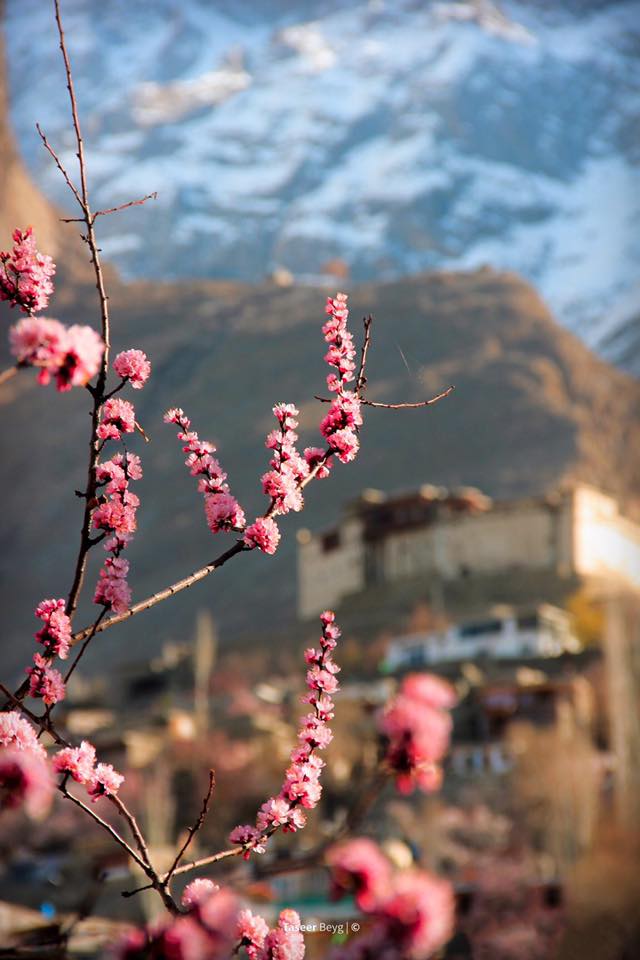
Nestled in the breathtaking Northern Areas of Pakistan, Gilgit Hunza stands out as a vital destination for travelers seeking to immerse themselves in nature, embark on thrilling adventures, or explore rich historical sites. With its stunning landscapes, majestic mountains, and serene lakes, our Hunza Tour Packages offers an array of attractions that promise unforgettable experiences. Here are the top 10 must-visit tourist attractions in Hunza Valley:
Attabad Lake was formed due to a massive landslide in 2010 that killed 25 people and blocked the Hunza River flow at its point for five months. Because of flooding, around 6000 people were displaced from their homes and stranded around 26,000 from upstream villages. Moreover, the huge landslide led to inundation of more than 19 kilometers of the Karakoram Highway. Later on, it stretched up to 21 KM long, entirely lower village of Shishkat, and some parts of Gulmit went underwater. One of the best places to visit in Hunza Valley Tour Packages.
The untouched and pristine nature of the Passu Cones makes them an ideal destination for someone like me who is always up to seeking remote and unspoiled vistas. Where activities and nature entwine, the breathtaking beauty of Attabad Lake and rich heritage come together in perfect harmony! Captured in this stunning frame is the essence of Upper Hunza, Gilgit-Baltistan, a testament to the region’s unparalleled natural splendor and cultural significance.
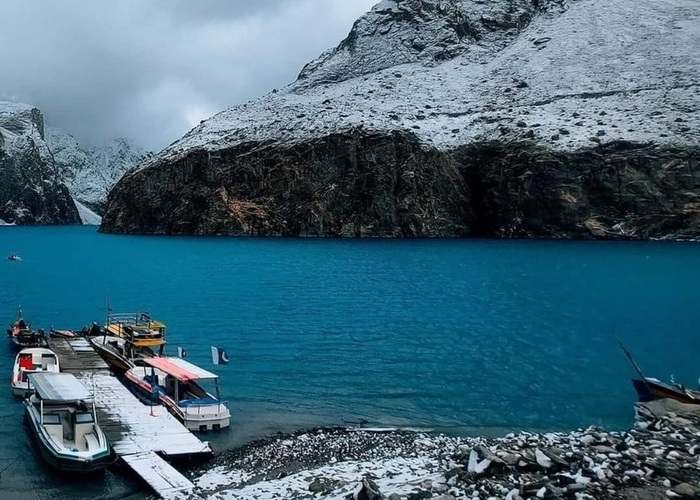
The naturally created Attabad lake has become a place of great activities for tourists. It has become a significant source of earnings for locals too. Many hotels and resorts have been established, and one who comes to Hunza must visit this beautiful masterpiece. One of the most famous chains of hotels, Luxus, opened Luxus Attabad Lake Resort right on the bank of the lake with amazing views from the resort rooms that attract many tourists who wish to stay here in the Attabad Lake resort. Many other premium hotels and resorts are available for a night’s stay to enjoy the lake’s natural beauty. “TripMaker” offers its most popular tailor-made and Tour Packages to Hunza & Attabad Lake at economical prices.
Eagle’s Nest is a breathtaking location located near Karimabad city in the Hunza district of Gilgit Baltistan region. With a bird’s eye view of Hunza District from the top of the hill, you can view the majestic Rakaposhi Peak, Lady Finger Peak, Ultar Peak, and the breathtaking rivers and Lakes of Hunza.
It takes a drive of only 15 – 20 minutes from Karimabad Bazar to reach Eagle Nest View Point. You should book a jeep which cost you Rs.5000 for a round trip from Kariamabad Hunza prior because they know how to drive through the rough and zigzag narrow track and will ensure a safe journey.
Here you will find a very renowned hotel aptly named Eagle’s Nest Hotel, where tourists can enjoy finger-licking food and enjoy the soothing environment. If one wakes up early and hikes to Eagle’s Nest after a little hike, you can witness the incredible sunrise and rays falling on the mountains.
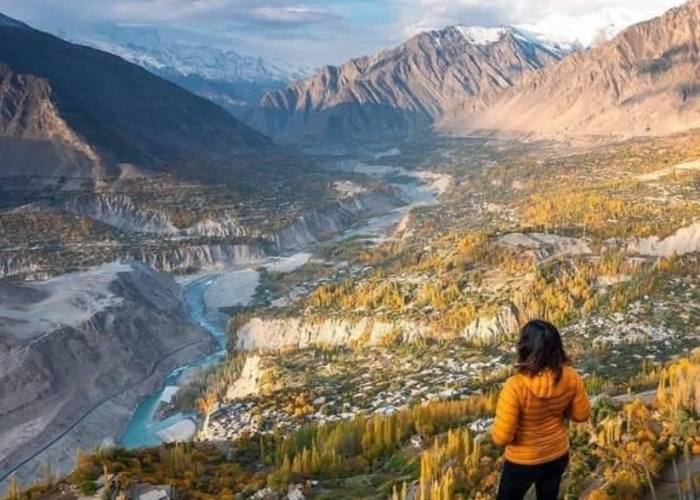
The old suspension bridge over the Hunza River reminds us how difficult it must have been to supply these isolated areas in the past. Before roads were built, supplies were carried along the frozen Hunza River.
Parking on the Silk Road, you will have to walk down to the bridge. You will see small traditional clothing shops and dry fruit stalls around this beautiful rough path, which are run by some men and women. With a smile from passing shops, welcome words of “Islam Alaikum” will also be heard, which will cause you to remove your travel fatigue.
If you take a turn in these thoughts, you will stand in front of the bridge. During the British Raj, this bridge was built in the village “Shashkat” of Gojal Valley. Later, during the construction of the Silk Road in 1968, on the orders of Mir of Hunza Muhammad Jamal Khan, it was moved to “Hussaini Village” to connect Hussaini village and “Zarabad Village” on the other side of the Borat/Hunza River.
The current bridge was constructed in 1994 when the previous bridge was flooded. It is about 100 feet above the river and is close to 700 feet in length. Iron ropes and 400 or less/more wooden planks have been used to make it. There is so much distance between the wooden planks that the man can easily cross the river.
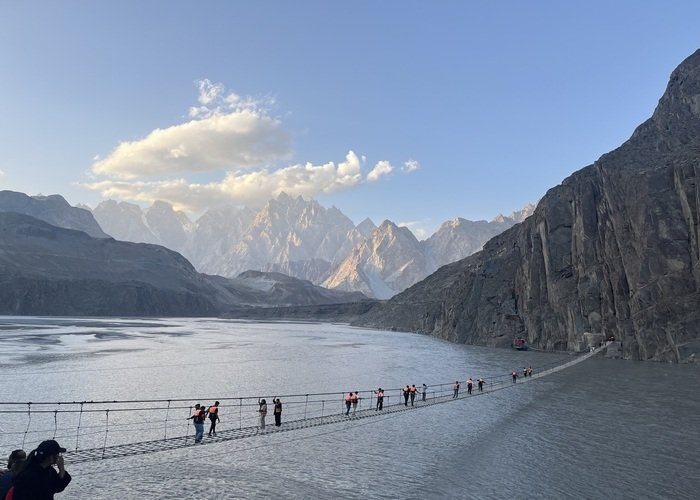
Satrangi and Blue lakes in Naltar is probably one of the most spectacular Excursions in Pakistan, for those who like a little bit of adventure. The road to Naltar is pretty but Very dusty until the village of Nomal after Nomal you drive along the side of mountains and the climb is quite steep. At the upper Naltar, you very instantly see the beautiful meadows the temperature is also very comfortable so one can get a fancy escape from Gilgit`s heat. There is a small restaurant at the meadows which can serve a hot meal or you can carry Lunch boxes from Serena and have the restaurant make tea for you.
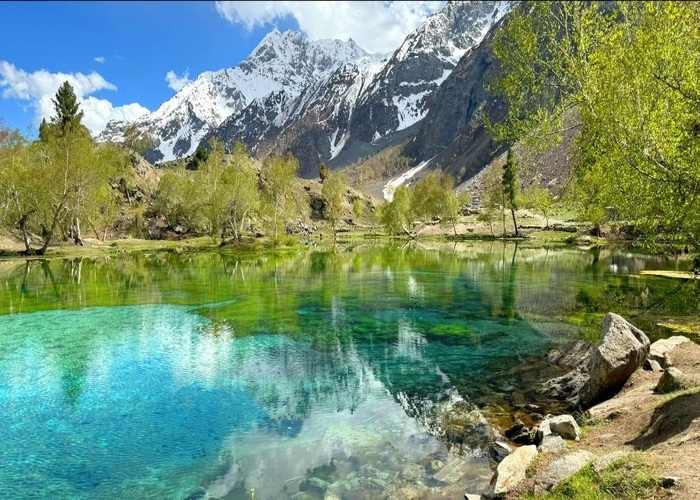
The Hopar Valley is one of the best places to visitin Hunza Valley. It has a pleasant climate, scenic beauty, and a variety of fruit cultivation, including apples, peaches, apricots, pears, and persimmon trees. It is considered one of the best places to visit in Hunza Valley with your family in the summer and winter tourist destination.
It is spreadacross the five glaciers in this village close to the Rakaposhi mountain range:
It attracts tourists with views of the Himalayas and Victorian-styled colonial architecture. Rakaposhi is the highest peak at 7,788 meters and is also called a singing hill due to the pleasant sound of the winds flowing through the woods. Nagar Valley, surrounded by lush green forests, cascading waterfalls, and scenic viewpoints, is another tourist place.
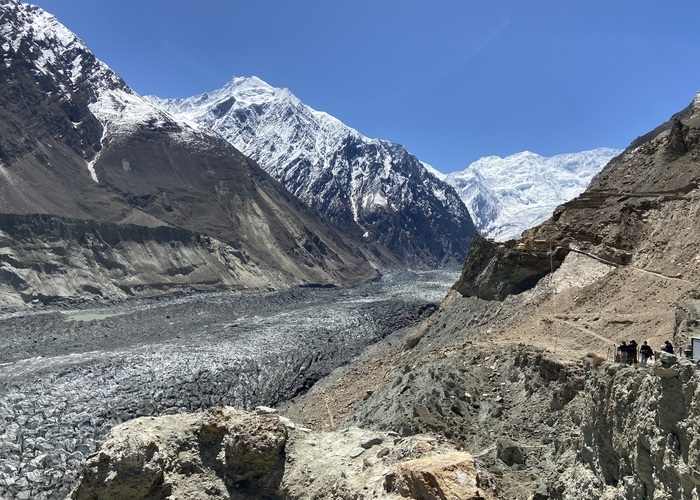
The Khunjerab Pass (Pak-China Border) connects the Northern tip of Pakistan with the far west of China and is the world’s highest paved border crossing. In addition to trade and local business, it is also used for official government activities, and of course for adventurous overland travel.
From Hunza to Sost the distance is around 100 km and takes 2.5 to 3 hour estimated. From Sost to the Khunjerab National Park entry point is about another 30/35 km and takes up to 1.5 hours on one side. From the National Park entry gate to the Khunjerab border pass is 50 km and takes up to around 2 hours. So the whole round trip from Hunza Valley to the border and back is a full day of around 8 or more hours.
Suggested Read: 10 Best Places to Visit in Azad Kashmir Neelum Valley
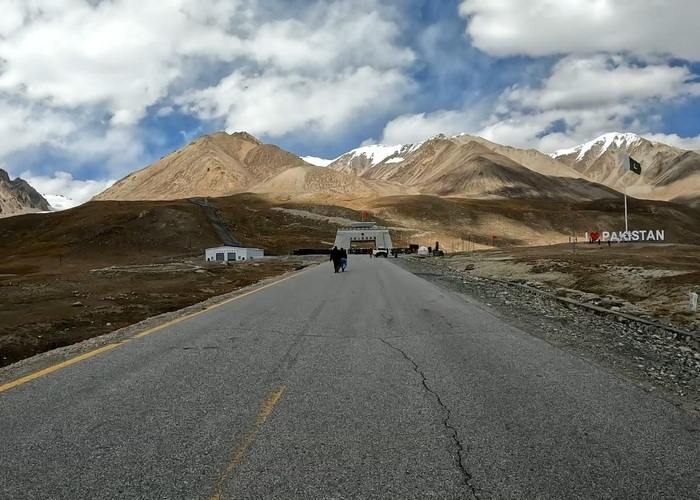
Rakaposhi is the 27th highest peak in the world and the 12th highest peak in Pakistan, and it is located in the Karakoram Range in Gilgit-Baltistan. Rakaposhi Viewpoint is a point on Karakoram Highway, famous as one of the most visited tourist attractions on the way to Hunza Valley.
It is located in the midst of the Nagar and Bagrote valleys, roughly 100 km (75 minutes) in the North of the Gilgit (semi-autonomous Gilgit-Baltistan region of Pakistan).
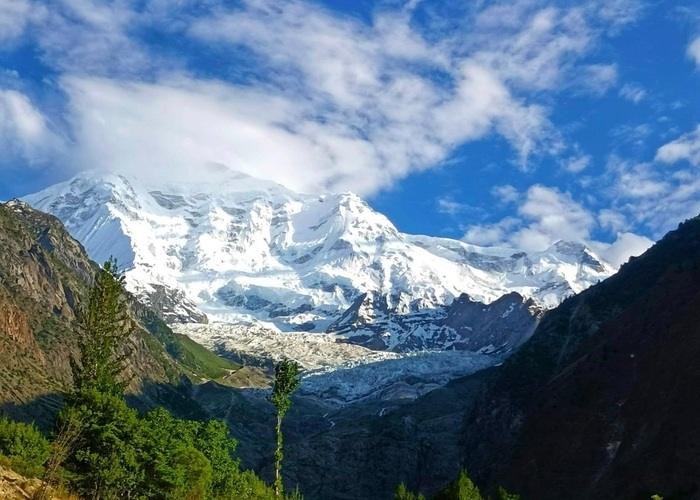
Karimabad is the capital of Hunza Valley, Baltit is the old name of Karimabad. It is named after Prince Karim Aga Khan, the spiritual head of Shia Ismaili Nizari community. There are many restaurants and cozy hotels available at Karimabad Market. You can see the whole Hunza Valley from this market.
People still refer to Karimabad as Baltit. The Guardian ranked it as one of the five Best Tourist Sites in Pakistan Both Baltit Fort and Karimabad village received the World Award of Tourism in 2000 when Indonesia, Australia, India Britain, and other countries competed.
Suggested Read: 10 Perfect Places to Visit in Skardu with Family
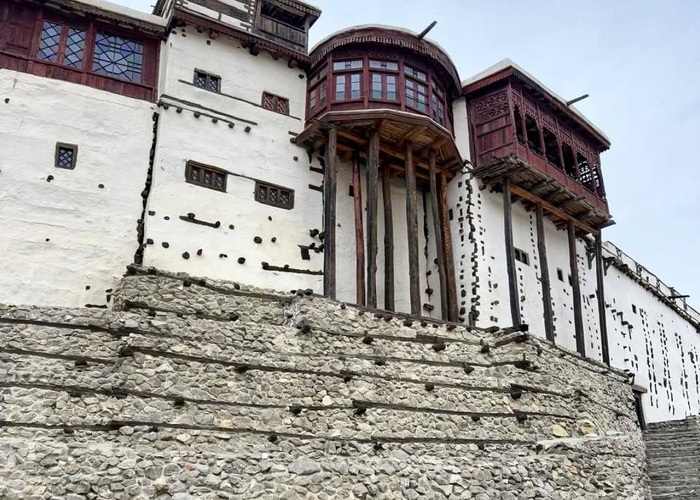
There are many kinds of fruits cultivated, eg. apricots, cherry, nectarine, peaches, apples, plum berries, grapes, pears, etc. When we talk about the Hunza fruits we can not forget about Hunza apricots. Apricot trees are more common in Hunza Valley, which is the famous legendary fruit of the valley and in ancient times was the main source of food. Hunza people used apricots juice as a diet they dried them in summer and used them in winter season That’s why they never had cancer or low cancer rate. While the other stone fruits are also significant crops in these areas.
Nestled in the cradle of the Karakoram Range, the Passu Cones are a group of awe-inspiring mountains situated in the Upper Hunza district of Gilgit Baltistan, Pakistan. This array of granite peaks can be found in Passu village, approximately 50 kilometers away from Hunza town.
The Passu Cones offers a breathtaking amalgamation of beauty and grandeur. These granite peaks rise majestically, decked up with dramatic ridges, sharp spires, and towering cliffs. The immaculately crafted geometrical cones caught my attention throughout my entire journey from Sailing Valley to Machlu and I just couldn’t stop myself from clicking them as These captivating Peaks offer innumerable views to behold.
Suggested Read: Must Visit Tourist Destinations in Swat Kalam Valley
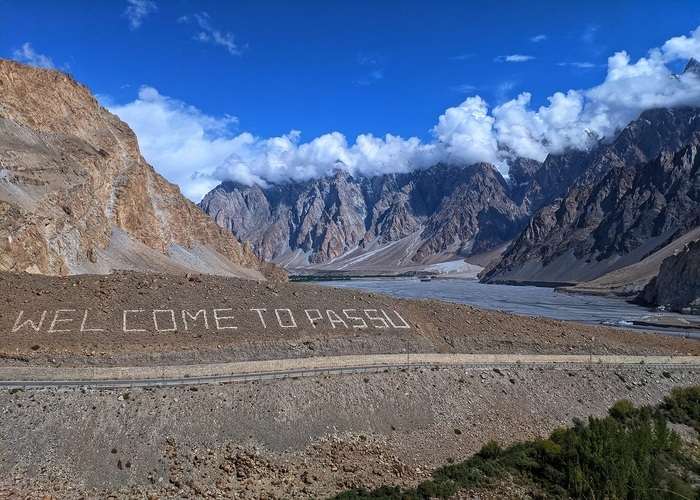
Karakoram Highway has the stunning beauty of the landscape, is surrounded by the mighty mountains, runs through Hindu Kush, Pamirs, Kunlun Mountains, and Karakoram Range is an international high-altitude road. Karakoram Highway connects Pakistan with Kashgar western Xinjiang region of China. Karakoram highway is also known as the Pak-China friendship highway in both countries. Also, check the weather first before travelling on KKH.
The road took 20 years to compete with workers’ sacrifices of deaths due to Asia’s rugged and challenging terrain. That’s why Karakoram Highway is called the 8th wonder of the world. Karakoram highway completion date is 1978; however, it was opened to the public in 1985. The beautiful Karakoram highway is also called Zhongba Youyi Gonglu by Chinese.
The Highway is a great place to get a panoramic view of towering mountains, and it is, maybe, only one among the places from where you can witness an 8000-meter-high mountain from your car window. As it is the highest paved road in the world, the highway reaches 4,800 m at Khunjerab Pass.
Tourists around the globe travel on this road to witness the region’s majestic beauty. It ends from the Pakistan side at Khunjerab Pass (Pak-China border). Karakoram highway weather is cold and remains cool even on summer days. One more question frequently asked, is the Karakoram highway safe to travel? Yes, as it lies in such a part of Pakistan, with a nominal crime rate. Gilgit Baltistan is considered one of the safest parts of Pakistan.
TripMaker Tourism Services offers the most fantastic Hunza Valley Tour for the Karakoram Highway Tour. As one of the most reliable and years of experience in the field, we will meet your expectations in holiday excursion.
Within the Hunza Valley near Gilgit City, atop majestic hills and on the banks of the clear and pristine Hunza River, ancient forts provide a small glimpse into the past. Originally constructed for the Mirs of Hunza Valley, the fort blends traditional Himalayan and Chinese architecture.
The Baltit and Altit Fort is a must-see in Hunza Valley because of its majestic fireplaces, beautifully constructed staircases, and meticulous wooden and stone works. Fortresses in Karimabad have been converted into UNESCO cultural heritage sites. As well as a folk art museum, there is an Ultar Sar spring that tourists shouldn’t miss.
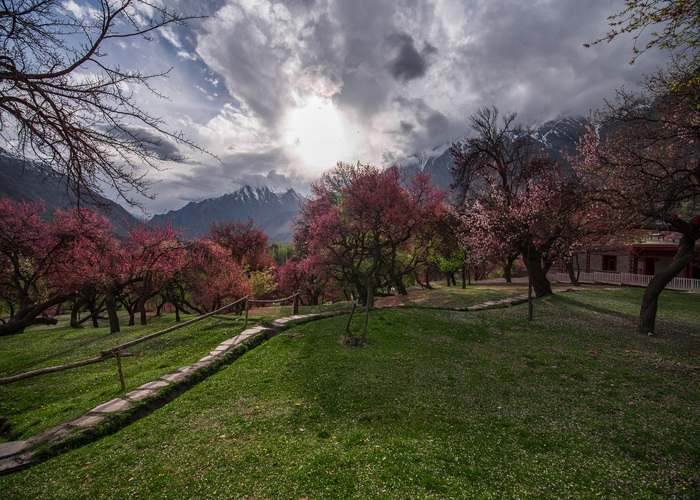
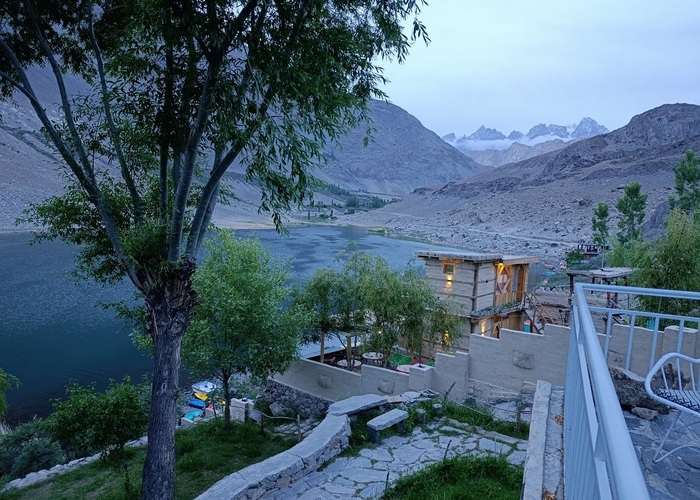
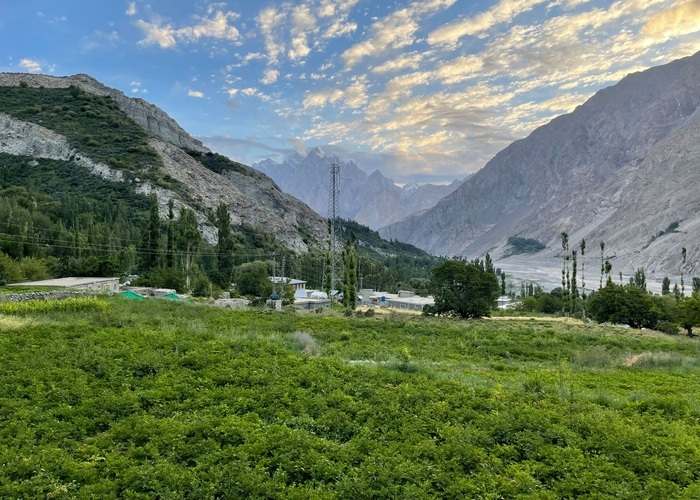
Shimshal Valley, situated in the Gilgit-Baltistan region of Pakistan, is renowned for its breathtaking natural beauty and diverse trekking opportunities. The towering peaks of the Karakoram Range surround this remote and picturesque valley.
Tourism in Shimshal Valley primarily revolves around trekking, mountaineering, and experiencing the unique culture of the Wakhi people who inhabit the region. Here are some popular activities for visitors:
Shimshal Valley is famous for its trekking routes, which offer stunning views of snow-capped peaks, glaciers, and alpine meadows. The trek to Shimshal Pass and Shimshal Lake is particularly favored among adventurers.
For experienced climbers, Shimshal Valley serves as a gateway to some of the world’s most challenging peaks. Expeditions to peaks such as Minglik Sar, Lupghar Sar, Dastgill Sar, and Yazghil Sar begin here.
Visitors can immerse themselves in the rich cultural heritage of the Wakhi people by staying in traditional homestays, interacting with locals, and participating in cultural events and festivals.
The valley is home to many wildlife species, including blue sheep, ibex, snow leopards, and numerous bird species, making it a paradise for wildlife enthusiasts and photographers.
The stunning landscapes, dramatic mountain scenery, and vibrant cultural scenes make Shimshal Valley a haven for photographers.
However, it is essential to note that due to its remote location and rugged terrain, traveling to Shimshal Valley requires careful planning, appropriate gear, and possibly the assistance of experienced guides or tour operators familiar with the area. Additionally, travelers should respect the local culture and environment while visiting this pristine region.
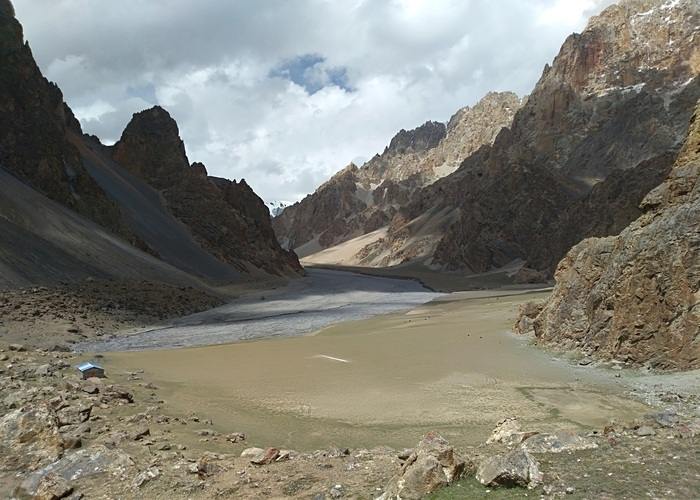
The trek to Rakaposhi Base Camp is regarded as one of the most scenic trails in Pakistan, offering an unparalleled opportunity to experience the breathtaking beauty of the region. This hike leads directly to the base of Mount Rakaposhi, which stands at an impressive height of 7,788 meters (25,551 feet).
In addition to the stunning views of Mount Rakaposhi, the trek features several other notable highlights, including the Minapin Glacier, which may be considered the most exquisite glacier in my experience, as well as the striking views of Diran Mountain, which has an elevation of 7,266 meters (23,839 feet). This journey promises to be a memorable exploration of some of the most picturesque landscapes in Pakistan.
Borith Lake is a charming high-altitude lake situated at an elevation of 2,600 meters (8,500 feet) above sea level. It is located within the small village of Borith, on the route leading to the Passu Glacier. The Passu Glacier is noted for its accessibility—it can be viewed from the Karakoram Highway, and reaching it requires only a brief walk from the parking area. With a length of 21 kilometers (13 miles), this glacier presents breathtaking vistas.
For individuals seeking an off-the-beaten-path destination, Chapursan Valley represents an excellent option. This valley is positioned near the border with the Wakhan Corridor in Afghanistan and is populated by the Wakhi people, an Iranian ethnic group residing in the mountainous regions of Pakistan, Afghanistan, Tajikistan, and China.
Eagle’s Nest is the designation of a hotel located a mere 30-minute drive from the town of Karimabad. Situated at an elevation of 2,850 meters (9,350 feet), it provides an exceptional panoramic view of the Hunza Valley.
For hiking enthusiasts in Pakistan, a day trek called the Ultar Base Camp hike is available in Karimabad. The journey begins close to Baltit Fort, leading you up to Ultar Base Camp, where you can admire the glacier and get a close view of the Ultar peaks. You can expect to spend approximately 4 to 5 hours reaching the ridge with breathtaking views of the enormous Ultar glacier and the striking jagged peaks of Ultar.
The village of Gulmit is home to Pakistan’s longest stairway, known as Ondra Poygah. This impressive structure comprises 1,655 steps that ascend to the ruins of an ancient fort called “Ondra.”
The trek to Ondra Poygah spans 1.3 kilometers (0.8 miles) and offers stunning views along the route. As one ascends, the vistas of Gulmit Village become increasingly spectacular. Upon reaching the fort, visitors are rewarded with views of the Passu Cones—ranked second on this list—and Shisper Peak.
For those interested in a brief hiking excursion around Attabad Lake, the hike to Baskochi Meadows is an outstanding choice. Depending on one’s pace, the journey typically requires between 45 minutes to 2 hours to reach the viewpoint. Once at the summit, one can appreciate an astounding view of the lake.
Given the expansive nature of the area, multiple stunning viewpoints are accessible; from above, the water appears exceptionally vibrant blue. While assistance from a local may be necessary to locate the trail’s starting point, the hike itself is relatively straightforward, as there is only one designated path that commences in the vicinity.
Finally, do not miss the chance to relax at Cafe de Hunza with a delightful cup of coffee and their renowned walnut cakes. They provide a variety of western-style coffees and pastries, so if you are craving a good coffee after traveling around Pakistan for some time, make sure to visit Cafe de Hunza and treat yourself to their coffee and cake options.
Embark on a picturesque three-hour journey from Hunza to the remote Shimshal Valley, absorbing the breathtaking views along the route. Pause for a leisurely break at Kuk, where you can witness the stunning sight of the glacier, celebrating nature’s marvels. Upon reaching Shimshal, indulge in a hearty meal featuring local specialties that showcase the region’s culinary heritage.
Experience an evening steeped in culture with a traditional performance that explores the vibrant customs of the Shimshal community. As night descends, settle into the warmth and hospitality of a local home, enjoying the authentic charm of Shimshal Valley as you prepare for a peaceful overnight stay in the serene setting.